[bannerTop]
Welcome to our LuckyStarting Virus removal guide. The following instructions will aid you in removing the unwanted software from your PC.
Basically, browser hijackers represent programs, which may be capable of altering your browser apps once they become incorporated into your system. What you might expect to happen as a result of the modifications of your Firefox, Chrome, Opera, Explorer or any other browser app, may comprise the following changes: enabling entirely new search engines and homepages to be displayed; setting your browsers to redirect you to web pages you have never intended to load; and, ultimately, broadcasting such a great number of pop-up ads that your browser tabs may get covered and your browsing might be interrupted. The exact version of a hijacker we are discussing below is called LuckyStarting Virus. It could possess the aforementioned features and do exactly what has been described above. In case you want to learn more specific and general details, proceed with reading the entire article.
Characteristics of Browser hijackers
The products from this software family function exactly in the way described above. They could only enter your PC, then access and alter the settings of your browsers. Another thing such a program might perform is to carefully review your browsing history, so as to produce exactly the ads that might suit your preferences. What’s more, sometimes the intense production of pop-up ads may become the reason for a substantial slowdown of your machine, especially if your processor isn’t the most powerful on the market and there is already a significant amount of data stored on it. However, even despite those questionable traits, such software has no malicious features and shouldn’t concern you much. You might be asking yourself why these hijackers are created in the first place? This sort of software may only serve marketing-oriented purposes. The main purpose of the so-called hijackers is to promote various products, websites, search engines, homepages and whatever other product could be promoted. This marketing-driven nature entirely explains the hijackers’ possible effects. In fact, you have nothing to worry about at all – nothing illegal and dangerous could result from the activity of any hijacker on your PC.
What distinguishes LuckyStarting Virus from the most malicious viruses? Is it harmless for sure?
Viruses such as the ones based on Ransomware and Trojans DO harm you and your PC. On the contrary, hijackers could never do anything dangerous or damaging. For example, in case your system has caught a Ransomware infection, all of the data you use on a regular/daily basis is in a grave danger. You may ask why- because such viruses tend to encode it and request a ransom in exchange for the hijacked files. If you are experiencing a Trojan-caused infection, on the other hand, you are facing plenty of possible issues, which include identity theft, data destruction, file corruption, and system crash. None of these malicious effects could come from a simple hijacker like LuckyStarting Virus.
Where and how you may catch LuckyStarting Virus
The most notorious sources of ad-producing software (like hijackers and Adware) are these ones: torrents, shareware, spam and software bundles. The said bundles actually represent mixtures of games, different versions of Adware and hijackers, as well as various apps and some newly-developed programs. Such a bundle can be available for free practically anywhere on the Internet. Nevertheless, it is not the process of downloading such a bundle that infects you with LuckyStarting Virus, it is the way you handle such a software mixture. All the software you download from the web should get installed in the most cautious way in order to avoid all annoying (and all the really harmful) potential contaminations. There is a way of installing any program properly and safely, and it is by following this piece of advice:
- Check for the Advanced installing option when the installer is generated. In some wizards this option could be called Custom {or Customized} – it is really of no importance. What’s important is that such an installation method will allow you to safely install the desired bundle and manually select what to leave behind and what to put into your system. It’s essential that you bear that in mind and use one of these features whenever you can, in order to avoid all kinds of infections.
Some more advice on how to stay away from LuckyStarting Virus
It is always a good idea to install the greatest anti-malware program available. Spend a little more money on prevention and you won’t regret it. Such tools have built-in features that warn you about suspicious software and web locations.
The way to successfully remove LuckyStarting Virus
To get rid of this hijacker, you can closely follow the instructions below. We have gathered them in the Removal Guide.
SUMMARY:
| Name | LuckyStarting Virus |
| Type | Adware/Browser Hijacker |
| Danger Level | Medium (nowhere near threats like Ransomware, but still a security risk) |
| Symptoms | Just some slight changes of your browsers – your homepage and search engine could be switched for other ones; some redirecting might be set to occur and many pop-ups might start affecting your online experience. |
| Distribution Method | Via bundling; enabling browser extensions and add-ons; downloading suspicious torrents; watching movies/videos on illegal websites online. |
[bannerTop]
Welcome to our LuckyStarting Virus removal guide. The following instructions will aid you in removing the unwanted software from your PC.
LuckyStarting Virus Removal
I – Uninstallation
[bannerMiddle]
- Use the Winkey+R keyboard combination, write Control Panel in the search field and hit enter.

- Go to Uninstall a program under Programs.

- Seek the unwanted software, select it and then click on Uninstall
- If you are unable to spot LuckyStarting Virus, search for any unrecognized programs that you do not remember installing on your PC – the unwanted software might disguise itself by going under a different name.
II – Safe mode and revealing hidden files
III – Cleaning all your browsers
- Go to your browser’s icon, right-click on it and select Properties.

- Go to the Shortcut tab and in the Target make sure to delete anything written after “.exe”.

- Now, open your browser and follow the instructions below depending on whether you are using Chrome, Mozilla or IE.
- Chrome users:
- Go to your browser’s main menu located in the top-right corner of the screen and select Settings.
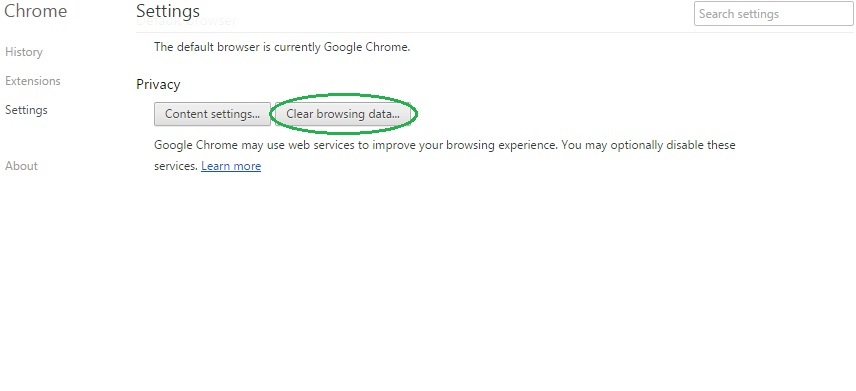
- Scroll down, click on Show Advanced Settings and then select Clear browsing data. Just to be sure, tick everything and clear the data.
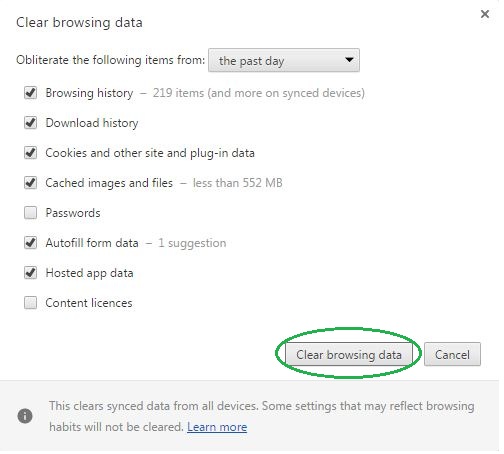
- Now, in the left pane, go to Extensions and look through all extensions that are integrated within your browser. If you notice any suspicious add-on, disable it and then remove it.
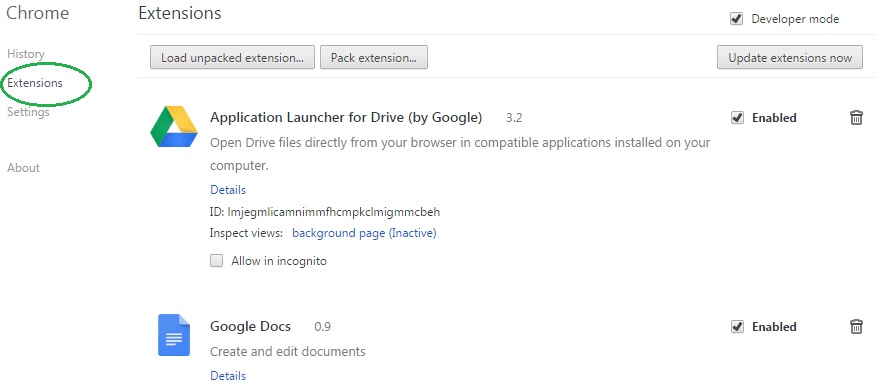
- Firefox users:
- Similarly to Chrome, go to the main menu and select Add-ons and then Extensions.
- Remove any suspicious browser extensions that you may have even if they do not have the name LuckyStarting Virus on them.
- IE users:
- Go to Tools and select Manage add-ons.

- Click on all add-on types from the left pane and check if there is anything suspicious in the right panel. In case you find anything shade, make sure to remove it.
IV – Removing Shady processes
[bannerMiddleSecond]
- Go to your start menu, type Task Manager in the search field and from the results open View running processes with Task Manager.

- Thoroughly look through all processes. The name LuckyStarting Virus might not be there, but if you notice any shady looking process that consumes high amounts of memory it might be ran by the unwanted program.
- If you spot the process ran by LuckyStarting Virus, right-click on it, open its file location and delete everything in there. Then go back to the Task Manager and end the process.

V – DNS check
- In the start menu search box write View Network Connections and open the first result.
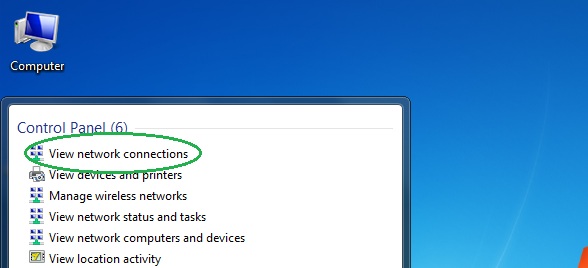
- Right-click on the network connection you are using and go to Properties.

- Select Internet Protocol Version (TCP/IPv4) and click on Properties.

- If Obtain DNS server addresses automatically is not checked, check it.
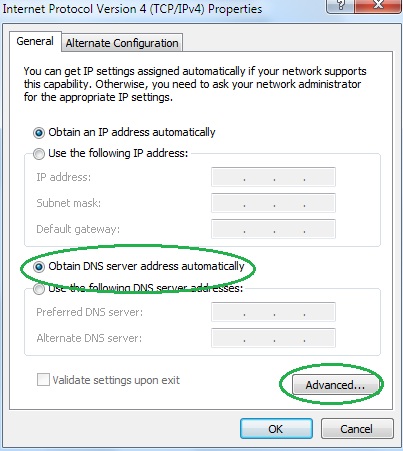
- Go to Advanced and select the DNS If there is anything in the DNS server addresses field, remove it and click OK.

- Click OK on the rest of the opened windows.

You need to join in a contest for one of the most useful blogs on the internet. I will recommend this web site!